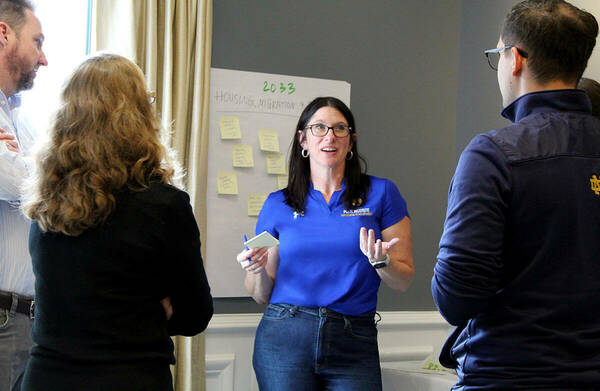The new Poverty Initiative will fundamentally change how the University of Notre Dame guides poverty alleviation programs to make a meaningful impact on at-risk populations worldwide.
Press Release: Notre Dame launches unprecedented University-wide effort to fight poverty
In 2023, University of Notre Dame Provost John T. McGreevy announced the Notre Dame Poverty Initiative, one of three strategies emerging from the University’s Strategic Framework. Led by the Wilson Sheehan Lab for Economic Opportunities (LEO) in the College of Arts and Letters and the Pulte Institute, an integral part of the Keough School of Global Affairs, the Poverty Initiative aims to establish Notre Dame as a premier university for poverty-related research, student formation, and policy and program impact.
According to the World Bank, 48 million people, about eight percent of the global population, live in extreme poverty, which means they subsist on less than $2.15 per day. When the threshold is expanded to $30 per person per day, or slightly more than $10,000 per year (a figure that constitutes the poverty line in high-income countries), 85 percent of the world’s population can be classified as living in poverty.
To identify key obstacles that stifle human flourishing and address them more efficiently and equitably — the Pulte Institute is working to scale up its capacity for poverty research and student training. It’s assisting leaders in making policy choices today that will improve the quality of life for generations by building an infrastructure to swiftly move knowledge into action.
 William J. Pulte Director Tracy Kijewski-Correa facilitates a design thinking workshop for Pulte Institute researchers, exploring durable solutions to the insecurity created by homelessness.
William J. Pulte Director Tracy Kijewski-Correa facilitates a design thinking workshop for Pulte Institute researchers, exploring durable solutions to the insecurity created by homelessness.“Our work honors human dignity and tackles the systemic causes of poverty,” says William J. Pulte Director Tracy Kijewski-Correa. “The formidable challenges we face can only be addressed with committed partnerships, world-class interdisciplinary expertise, and the research infrastructure that the Pulte Institute, LEO, and the University as a whole brings to bear.”
In addition to hundreds of partnerships with international, national, and local organizations such as USAID and Catholic Relief Services, with its work under the Poverty Initiative, the Pulte Institute will specifically leverage global networks around SHARE (Supporting Holistic and Actionable Research in Education), CARA (Central America Research Alliance), and FLARE (Forests and Livelihoods: Assessment, Research, and Engagement).
“Working in over 70 countries, one of the Pulte Institute’s distinguishing features is our capacity to accelerate impact globally,” says Kijewski-Correa. “By joining deep disciplinary expertise with local knowledge, we are lowering the barriers to conducting global research and increasing discovery, pursuing promising paths forward that only a collective effort can forge. We then share that knowledge across countries so the successes in one nation can become successes for all.”